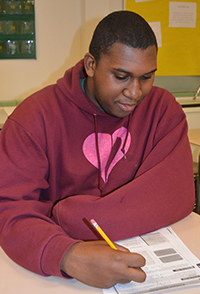Lori Hayes is finishing up math and science courses in the Wyoming Public Schools Adult Education Program to earn her GED. Once in awhile, she has to bring her 10-year-old daughter, Chloe, to class with her.
One day, after listening to a lesson led by teacher Justin Van Etten, Chloe walked up to the white board and correctly finished a math problem. “That’s why I’m doing this,” said Hayes, who has two other daughters, ages 17 and 15. “I didn’t really see how important this is until I saw her up there doing what I was learning. It was inspiring.”
Hayes, 37, is among thousands of adults statewide working to earn GEDs, improving their basic literacy and math skills or learning English in state-funded adult education programs. They are seeking brighter futures, better paying jobs, college degrees and careers. Many, like Hayes, also hope to give their children a better chance at their own dreams.
Statistics for Adult Education Participation in West Michigan
Source: State of Michigan |
Hayes and Jeremy Showell, also a Wyoming student, served as first-hand voices on the impact of adult education programs and the need for improved investment and resources. They joined fellow students from across the state in addressing legislators and key policymakers during “FamilySpeak: Building Family Literacy Through Adult Education” at the State Capitol in Lansing.
The event was hosted by Michigan’s Children, a nonprofit organization focused on the needs of the most challenged children from birth to adulthood and their families, and the Michigan Association of Community and Adult Education, which works to provide a framework for community education at the local, state and federal levels.
Bob Steeh, president of MACAE, said state aid for adult education was reduced in the 1990s from $80 million to $22 million, forcing many programs to close. Now allocations total about $25 million, and students in state-funded programs, usually run through school districts, have dropped from 80,000 to 29,000 per year. Programs decreased from 175 to 75.
Fewer locations mean many students make long daily treks to get to class.
“It all equates to how you can access programs. My biggest argument is if we want to curb poverty and change the lives of families, we have to do something about that,” Steeh said.
As the state is pushing to improve third-grade reading proficiency, investment needs to target the entire family, said Michele Corey, vice president of programs for Michigan’s Children. Statewide, 42,000 people ages 18-34 have less than aninth-grade education.
“There’s a lot of evidence that talks about how connected the kids’ educational success is with their parents’ educational success,” she said.

Navigating Their Educational Dreams
The 17 student speakers included recent immigrants from Iraq, Somalia and Mexico, single mothers who want to help their children in school and non-traditional learners who dropped out of high school and have struggled to get by on minimum-wage jobs.
Showell, 20, signed up for the program after slipping through the cracks in high school. He had attended an alternative high-school program that closed and was completing an online program when he aged out of the K-12 system. He now has one class left before finishing his GED and hopes to enroll at Ferris State University.
“All sorts of opportunities are opening up for me,” he said. “I can maybe go to college and find a better job. That’s something that’s really important.”
Wyoming Community Education Director Oogie LaMar said he wanted his students to have a presence at the forum because of the significance of adult education to people’s lives.
“The impact overall is huge,” LaMar said. “First and foremost, adult ed is non-judgmental. People get there for whatever reason they get there. Our job is simply to help them reach their potential, to navigate that last part of their educational dreams.”
But barriers for potential students include transportation, money for transportation and childcare, advocates say. Students must have flexibility to work around jobs and family needs.
Also, some adults are unaware of existing programs.
“I never knew of adult-ed programs. I was pretty much in the dark,” said Hayes, who now works as a deejay. She wants to get a college degree in criminal justice.
A mother of three, she dropped out of school at 15, and has worked many different jobs. She now sees new possibilities as she pursues her goals.
“I know there are people out there that can help me,” she said. “It’s one of the best things. There’s no way I could just walk away now.”
CONNECT
Michigan Association of Community and Adult Education
SNN Article on Third Grade Reading
SNN Article on Correlation Between Poverty and Student Achievement









